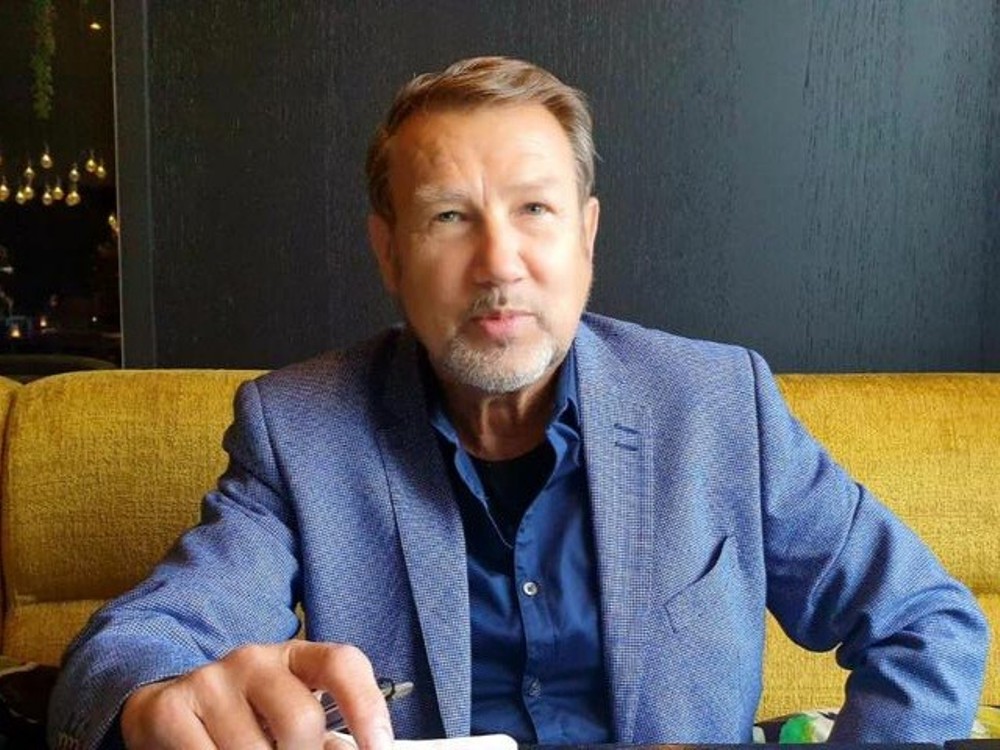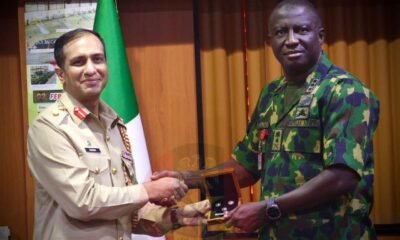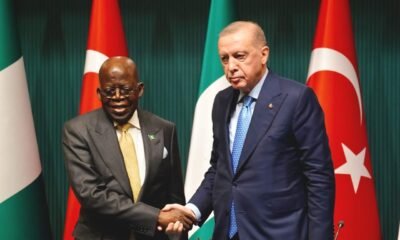FEATURED
Why Caseload Of Mad People Is Very High In Nigeria – German Psychiatrist

Dr. Ernst Josef Franzek, a medical specialist in Neurology, Psychiatry and Psychotherapy, in this telephone interview with BIGPEN NIGERIA editorial team, spoke on sundry issues in the healthcare sector in the country particularly why the caseload of mentally ill people is astronomical. Happy reading:
Recently the Legionnaire for Mankind’s Health which you founded was inaugurated in The Netherlands. As the founder of this organization, can you tell us more about yourself and why you decided to established this NGO?
My name is Ernst Josef Franzek, I am born 1953 in Germany into a poor family. I have one daughter and two sons and till now there are three gorgeous grandchildren. My father was a labourer who always worked very hard for his loved ones, so we always had enough to eat. Because of my father’s great effort I was able to get a quality education and I could finish a University study in Medicine at the Ludwig Maximilian University (LMU) Munich in Germany. I become a general practitioner and later a medical specialist in Neurology, Psychiatry and Psychotherapy.
At the University of Würzburg, Germany, I got my PhD in 1990 and in 1995 I reached a qualification as a University lecturer in Psychiatry with the thesis and study object: “Psychoses of the Schizophrenic Spectrum in Twins. A Discussion on the Nature – Nurture Debate in the Etiology of Endogenous Psychoses”.
Since 2003 I have been working in the Netherlands as a clinician and researcher with special focusses on Addiction, Double Diagnosis and Mental Health Care in general.
Since 2018 I have been working as a senior psychiatrist by Yes We Can Clinics in The Netherlands, a clinical treatment approach for young people from age 13 to 23 years suffering from complex psychic and psychological disorders, inclusive addiction.
Since 2008 my scientific interest has been focused on the consequences of (prenatal) malnutrition on mental health later in life.
On why I decided to setup the NGO…?
The population of Nigeria with now about 200 million people is mostly younger than 40 years. It means life expectancy is far below 60 years. This is caused by many early deaths before age five. The reason for this is prenatal and early postnatal malnutrition, lack of adequate midwifery and early baby care. Another reason of the high prevalence of deaths before 59 years is diseases which could have been easily treated by a normal functioning health care system. However, proper healthcare is only available for the privileged and upper class people. It is obvious that only the few privileged people in the country have a life expectancy compared to the civilized western countries. An overwhelming number of people in Nigeria, however, live in poverty or even in extreme poverty with less than 1 dollar income per day. This means that the great majority of Nigeria’s populace does not suffer from diseases caused by abundance, but in contrast by diseases caused by scarcity like lack of healthy food, lack of clean drinking water, lack of proper sanitation. It screams to the sky that more than 40 million people do not even have functioning toilets and adequate sanitation.
The consequences of these dreadful and inhuman situations are high levels of violence, criminality, insurgencies, child soldiers, mental diseases including addictive behaviors.
The problem of Africa is poverty, mismanagement of resources, neglect of the youths, and exploitation of natural resources through the highly civilized world. Since more than 500 years Africa is exploited from its resources, the common population is enslaved with starvation wages and child labor. The last century’s modern work-slavery took over the place of the ancient slave trading.
Charity is often used to cover up crimes on humanity and environment. The NGO “Legionnaire for Mankind’s Health” is not a charity organization. Nigeria and Africa does not need charity. Nigeria and Africa can preserve themselves. What Africa needs is empowerment of its own population. Magic elements of this approach must be respect for the sanctity of every human’s life, free midwifery and primary baby care, available healthy food and clean water, quality education for everybody, free University education for skilled young people, keeping well educated people in the country (no brain drain), making natural resources benefitting the whole populace and not only being of benefit for a few privileged and often greedy business organizations. Not the status of parents should determine the life and development of Nigeria’s and African’s children and youths, but talents, skills, ambition and personal effort. These issues should belong to the major tasks of elected governments.
What are the major aims and objectives of this organization and why do you specifically target Nigeria among other African countries?
The primary starting point of the “Legionnaire for Mankind’s Health” is Africa with a special focus on Nigeria. When I first met Comrade Sunny Ofehe, living in The Netherlands, born in Delta State, I started to immerse myself into the problems of Nigeria. Sunny informed me about his own story and the exploitation of natural resources through a well-known oil company of Europe. My heart cramped and I got constantly thinking about solutions for this great nation of now about 200 million people. I visited the country together with Sunny first in December 2017 and then alone in December 2018. I saw the unbelievable contrast of extreme richness and extreme poverty, I saw a country that could be a paradise for its people, but is kept in custody by few selfish and greedy people who are only looking for power and money without respect for basic human rights and needs of common people. I fell in love with this sleeping beauty and her common people, who are fighting every day for their daily living. I got inspired by Sunny Ofehe, his deep love and passion for his people in Delta State and his restless activity to bring Delta State and its problems into the attention of the public. I correlated the situation of Nigeria with the results and conclusions of our studies on the consequences of prenatal malnutrition on somatic and mental health later in life. I found it conceivable that the consequences of chronic hunger and malnutrition, lack of future for the youths are at least partly a reason for the high prevalence of violence, criminal and addictive behaviors in Nigeria. We deduced the overall conclusion that criminals, addicted and other (mentally) ill people must not be the only focus of interventions of governments. However, the underlying problems like lack of enough and healthy food, lack of clean water and adequate housing, lack of midwifery and adequate baby care, lack of adequate sanitation, lack of primary and secondary education, have to be tackled intensively.
On the aims and objectives…?
The Legionnaire of Mankind’s Health is not a charity organization. The organization stand for encouraging and putting people in a state where they can peacefully gain access to; Basic human rights for everyone; Respect of sanctity of life; Cooperation when it comes to resolving common (global) issues of mankind. Also, infrastructures for agriculture, industrial and economic development without being hampered by individual greedy behaviors.
Reconciliation with and integration of people fighting for basic human rights, better life circumstances and a proper future for their children, their youth and their own people and communities in general.

Dr. Ernst Josef Franzek speaking during the inauguration of Legionnaire for Mankind’s Health
As a renowned world expert of mental Healthcare, will your organization be focused on this area alone or you intent to look at the general healthcare sector in Nigeria?
Mental healthcare is a part of the general healthcare sector. Prenatal and postnatal malnutrition affects the health of a population in general. Our organization has to look at the general healthcare sector in Nigeria and thus intends working together with primary, secondary and tertiary health organizations. There is also the need of intensive discussions with the church and other religious institutions: (Mental) Health is not a matter of only praying to God in order to better the situation. God gives mankind the prerequisites for a healthy lifestyle, but people have to actively use their skills. Life is a matter of action, personal effort and personal initiative.
Nigeria is Africa’s largest population with the highest rate of people with mental illnesses, how do you think your organization can make an impact in this area and what is organization’s long term vision?
This question is already partly answered under sections 2 and 3.
The problems with respect to mental health care challenges are in particular acute psychiatric issues like depressive disorders, acute psychotic disorders and acute drugs related disorders. Mental health care should be integrated in the primary health care within the communities. Trained health care workers should be able to go with mobile units to the patient’s houses or communities. Regular consultation hours should be held by trained health care workers in the communities. It would be desirable that at least 1 psychiatrist would be available for 10.000 people (now 0,1 for 1 million people). Treatment wards should not only be concentrated in big cities. Mental health care in the primary health care situation should be fully funded by the government.
The revenue of natural resources of the country must be used for the health and wealth of local people and not only for the privileged ones and foreign investors coming from US, Europe and China. Health is wealth which is our current driving principle as stated in our motto.
You have written so many published articles in several world journals, which of your published article do you think carries the burden of health care challenges in Africa and how did this article deal with this problem generally?
The exposure to prenatal nutritional depletion of still unborn babies was found to be associated to a variety of somatic and mental diseases later in life, including addictive behaviors, antisocial personality disorders and interestingly we found a not earlier reported enormous excess of male births in our recent study, published in 2019 in the Open Journal of Nutrition and Food Sciences 1 (1): 1004.
Based on known and accepted facts in the scientific literature we discussed the consequences of pre-conceptual, prenatal and early postnatal malnutrition on Mental Health in adulthood. We came to the following conclusions and hypotheses:
First, prenatal exposure of the unborn baby to severe malnutrition significantly increases the risk of addictive behaviors later in life for both men and women. Men are most vulnerable after famine exposure in the first trimester of gestation, however, women after famine exposure in the third trimester of gestation.
Second, there is evidence that pre-conceptional exposure to severe starvation (malnutrition) and other life threatening stress situations of both mothers and fathers has a critical impact on sex determination in favor of male offspring. We found an enormous excess of male births that has never before been reported in the scientific literature. The following prenatal and early postnatal exposure to malnutrition of these babies obviously has a critical impact on the development of their brains with persisting antisocial personality traits and liability to addictive behaviors in adulthood, including aggressive and violent behaviors.
The health care challenges in Nigeria can be adduced to lack of government commitment and lack of medical personnel and infrastructure. As an expert in this field, where do you think the government of Nigeria is failing in their duties to either provide or improve healthcare in the country?
The budgets for Health Care are very low and health care institutions are mostly concentrated in big cities. Falling ill is for most people a catastrophe and a fall in even deeper poverty. Suffering from normally good treatable diseases is often life threatening. There are no proper health insurances and if you do not have money, doctors will not treat you. This means many people die from elsewhere good treatable and preventable diseases. The mortality rate before age 5 years is about 20% while in western societies the mortality rate before age 5 years is mostly below 1%. This mean age of the common people is far below 60 years, lowest in the Delta region (about 50 years) with its severe environmental degradation as a consequence of crude oil winning through the Shell Company. A great proportion of doctors who have finished their studies leave the country and start working in the US, Europe or UK, because of much better payment and working conditions. Almost none of them ever goes back to work for his/her own people. In Nigeria Mental Health Care is completely lacking outside big cities. Traditional healers and the church are treating severely psychiatrically ill people. As a doctor who cares for (mentally) ill people I feel very sad about this situation.
As you may know, we have shortages of trained mental health doctors in Nigeria and most top doctors have left the country to seek greener pastures abroad. What is your advice on how we can deal with this situation?
As I already mentioned above, this phenomenon is called brain drain. Young doctors leave the country because they find better working conditions and better salaries in other countries. The money, doctors are getting for their hard work in Nigeria, is not attractive for them. Working in the health care sector at all is not attractive, because health care has only a low status in politics in Nigeria. Politicians go outside the country when they need medical treatment, because they do not trust and rely on doctors and facilities of their own country. Again as a doctor who cares for (mentally) ill people I feel very sad about this situation.
The government must commit increase funding in the health care sector and review the salaries and wages of healthcare workers. The starting point should be setting up a committee to review the various purpose of increase brain drain in the country. If the working environment is improved, it will not only lead to decrease in brain drain but will also attract Nigerian health care workers abroad to return back to the country.
Many of the several health care cases in Nigeria is termed “spiritual” or consequences of evil act which several experts says are not true. What can you say about this and how do you reconcile the role of religion in dealing with mental healthcare in Nigeria?
The role of religion has to be redefined when it comes dealing with mental healthcare in Nigeria. The lack of scientifically based treatment of the mentally ill peoples has led to the situation that traditional and religious healers took over the treatment of even severe mentally ill patients. They do their best to improve the suffering of those patients but often worsen their suffering and creating inhuman procedures like chaining up these patients.
It will become a special task to adequately communicate with and educate the traditional and religious healers with modern and scientific based treatment methods. Mental illness is never a punishment of god, or a consequence of devils or witch craft. Mental illness must not be stigmatized but looked at and treated as equally to somatic diseases.
The government must embark on public enlightenment campaign to educate the general population on the need to change this general mindset among the people particularly in the rural areas of the country.
Will your organization be working with Government agencies and local Nigerian NGOs?
Our organization will be working together with both Government agencies and local Nigerian NGOs. Nigeria has to build up her own (primary and secondary) healthcare system with and for local people. The aim has to be getting independent from charity and independent also from NGO’s located in foreign countries providing charity.
Charity does not help to improve life conditions of poor people but just keep them dependent and vulnerable. Child work has to be banned, while primary and secondary education needs to be made compulsory. The position of women must be strengthened and forced marriages have to be banned.
These are additional areas we shall be offering our services of corporation among critical stakeholders in this sector. We are hopeful that with the resources and human capacity that Nigeria possesses, the country can achieve the United Nations Sustainable goal of health for all.




















